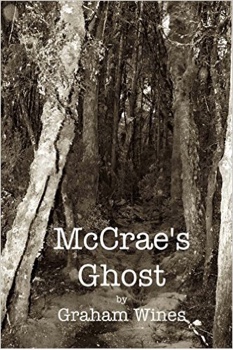"McCrae's Ghost" is historical fiction full of the kind of details history lovers crave, such as descriptions of 19th century residential and railroad construction technology; the history of architecture in Malta and Lisbon; the history of Islam and of the Suez Canal, the horrors of WWI; and the immense poverty in England following the war.
Arthur Richard Douglas McCrae is the focus of the novel. As a baby, he was very close to his maternal grandmother. After her death, it seemed that he would only be soothed by being in the room where her ghost was believed to visit. Naturally the reader wonders, is this grandmother McCrae's ghost?
Through his hard work, and extensive family connections, in 1897, McCrae is given the rank of full Lieutenant in the British Expeditionary Force, Royal Engineers. Despite what he has learned about the disastrous failure of military leadership in the Crimea, Sevastopol, and the slaughter of the Light Brigade, the intrepid McCrae remains optimistic about the eternal British Empire. He is confident that "there was no country able to take on the might of the British navy. Britain ruled, and it seemed that the world would be safe in the hands of British rule." So the very young McCrae sets out to stamp his legacy on the empire by using the might of steel and machines to build a great rail line that would open India "up to trade and influence."
As McCrae travels by sea to India, Wines does not stint on details or vivid descriptions. When McCrae beholds the wondrous night sky of Egypt where there are "stars for millions of miles, billions of them," he thinks, "here you felt like the heavens were ablaze with lights and God was watching, so you had better be on your best behaviour."
As expertly as Wines depicts McCrae's childhood and youthful successes, he delineates McCrae's slide downwards. Desperate to see his mother who he has not heard from in years, McCrae deserts his military post in India, only to learn that she had died three years earlier. Not wanting to be shot for desertion, McCrae kills a new friend and assumes his identity. Haunted by his crime, McCrae vows to live for both the deceased and himself. Again, one wonders, is the murder victim McCrae's ghost?
In his new identity, McCrae enlists to fight WWI. Wines pulls no punches in his vivid, detailed description of the trenches, and foul mud and gore of war; and in his delineation of McCrae's brutality to his growing family after the war. McCrae fathers six children, the oldest is Yvonne who bears the brunt of his physical and mental cruelty and rage. At age seven, she is doing all the housework and cooking, as well as taking care of her younger brother. Notwithstanding her unceasing labor, McCrae often whips her with his razor strop.
Wines dedicates the book to this Yvonne, his mother, "The Forgotten Child." He also dedicates the book to the grandfather he never knew, Arthur Richard Douglas McCrae, writing, "I hope this story does you Justice"/ "I hope you found Peace" /"You are Forgiven."
So, who is McCrae's ghost? Is the ghost the grandmother or the man McCrae murdered? The collective demons he fought his entire adult life? The childhood that McCrae stole from Yvonne? Is the ghost the McCrae name and heritage that McCrae abandoned and never bequeathed to Yvonne or her children? Or all of the above?
This is a stunning debut novel. From scraps of family lore and extensive historical research, Wines has created a believable story. Historical fiction is at its best when a plethora of accurate facts are woven into a compelling story. It is a genre owned by writers Herman Wouk, Leon Uris and Allen Appel to name a few of my favorites. In "McCrae's Ghost," author Graham Wines demonstrates through his meticulous research and descriptive prose, that he is heading in their direction.

* Print Length: 442 pages
* Page Numbers Source ISBN: 1470125870
* Publication Date: November 6, 2015
* Sold by: Amazon Digital Services LLC
No comments:
Post a Comment